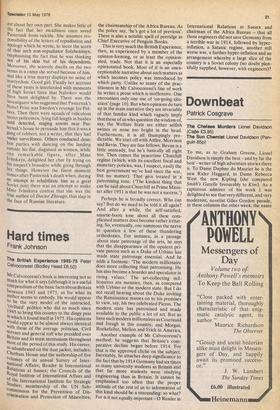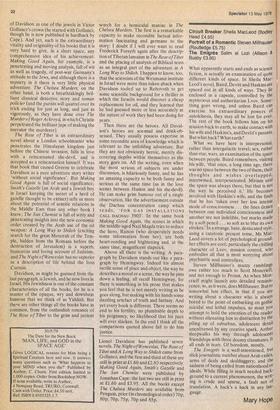Downbeat
Patrick Cosgrave
The Chelsea Murders Lionel Davidson (Cape £3.95) The Sun Chemist Lionel Davidson (Penguin 85p)
To me, as to Graham Greene, Lionel Davidson is simply the best — and by far the best —writer of high adventure stories there is. To Dame Daphne du Maurier he is the new Rider Haggard, to Dame Rebecca West the new Kipling (she compared Smith's Gazelle favourably to Kim). As a rapturous admirer of his work I was delighted to see that very different, and very modernist, novelist Giles Gordon parade, in these columns the other week, the name of Davidson as one of the jewels in Victor Gollancz's crown (he started with Gollancz, though he is now published in hardback by Cape). And yet, such is the extraordinary vitality and originality of his books that it is very hard to give, in a short space, any comprehensive idea of his achievement: Making Good Again, for example, is a penetrating and moving analysis, full of wit as well as tragedy, of post-war Germany's attitude to the Jews, and although there is a mystery in it there is very little physical adventure. The Chelsea Murders, on the other hand, is both a breathtakingly brilliant classical detective story and roman policier (and the purists will quarrel over its trick ending for just as long, and just as vigorously, as they have done over The Murder of Roger Ackroyc4 in which Christie perpetrated the brilliant jape of making the narrator the murderer).
The Rose of Tibet is an extraordinary novel about a London schoolmaster who penetrates the Himalayan kingdom just before the Chinese invasion, falls in love with a reincarnated she-devil, and is accepted as a reincarnation himself. It was that book that caused Greene to celebrate Davidson as a pure adventure story writer 'without social significance'. But Making Good Again is full of social significance; Smith's Gazelle (an Arab and a Jewish boy in Israel keeping the secret of a herd of gazelle thought to be extinct) tells us more about the potential of semitic relations in the Middle East than any other book I know; The Sun Chemist is full of witty and penetrating insights into the new economic order created by the Arab use of the oil weapon: A Long Way to Shiloh (exciting search for the great Menorah of the Temple, hidden from the Romans before the destruction of Jerusalem) is a superb, humorous and loving account of Judaism; and The Night ofWenceslas has no superior as a description of life behind the Iron Curtain.
Davidson, as might be guessed from the last paragraph, is Jewish, and he now lives in Israel. His Jewishness is one of the constant characteristics of all the books, for he is a master of the opaque, wry and downbeat humour that we think of as Yiddish. But there are other things all the books have in common, from the outlandish romance of The Rose of Tibet to the grim and patient search for a homicidal maniac in The Chelsea Murders. The first is a remarkable
capacity to make recondite factual infor mation fascinating and germane to the story: I doubt if I will ever want to read Frederick Forsyth again after the descrip
tion of Tibetan lam aism in The Rose of Tibet and the placing of analysis of Biblical texts as an integral part of the adventure in A Long Way to Shiloh. I happen to know, too, that the scientists of the Weizmann institute
in Israel were more than taken aback when Davidson tooled up to Rehovoth to get some scientific background for a thriller in which the Israelis would discover a cheap replacement for oil, and they learned that he had guessed more or less accurately at the nature of work they had been doing for years.
Then there are the heroes. All Davidson's heroes are sex-mad and drink-obsessed. They usually possess expertise in some recondite area of knowledge which is relevant to the unfolding adventure. But they are not obviously heroic, merely discovering depths within themselves as the story goes on. All the writing, even when the most serious of subjects are under discussion, is hilariously funny, and he has an amazing capacity to be both funny and serious at the same time (as in the love scenes between Huston and his she-devil). He can make grim humour out of a single observation, like the advertisement outside the Dachau concentration camp which reads, 'FOR GAS INSTALLATIONS CALL DACHAU 3903'. In the same book Making Good Again, the scenes in which the middle-aged Nazi Magda tries to seduce the hero,. Raison (who desperately needs some information from her), are both heart-rending and frightening and, at the same time, magnificent slapstick.
Above all there is the writing. A paragraph by Davidson stands out like a paragraph by Hemingway. Indeed his almost tactile sense of place and object, the way he describes a mood or a scene, the way he pins down a feeling, all recall Hemingway, for there is something in his prose that makes you feel that he is not merely writing as he goes along, but making with his hands some dazzling artefact of truth and fantasy. And yet every book is different. There seems no end to his fertility, no plumbable depth to his poignancy, no likelihood that his pace will ever slacken. In the end I think all the comparisons quoted above fail to do him justice.
Lionel Davidson has published seven novels. The Night of Wenceslas, The Rose of Tibet and A Long Way to Shiloh came from Gollancz, and the first and third of these are still in print at £1.60 and £2.83 respectively. Making Good Again, Smith's Gazelle and The Sun Chemist were published by Jonathan Cape: the last two are still in print at £1.60 and £3.95. All the books except The Chelsea Murders are available from Penguin, price (in chronological order) 70p, 80p, 70p, 75p, 70p and 85p.
Circuit Breaker Sheila MacLeod (Bodley Head £4.95) Portrait of a Romantic Steven Millhauser (Routledge £5.75) The Emigres Salim el Lozi (Allison & Busby £3.95) What apparently starts and ends as science fiction, is actually an examination of quite different kinds of space. In Sheila Mac Leod's novel, Baird, Devitt and Haskins are spaced out in all kinds of ways. They lie enclosed in a capsule, controlled by the mysterious and authoritarian Lvov. Something goes wrong, and unless Baird can exercise his extraordinary powers of autokinesis, they may all be lost for ever. The rest of the book follows him on his mission back to earth, to make contact with his wife and Haskins's, and Devitt's parents. But what back? What earth?
What we have here is interpersonal, rather than intergalactic travel; sex, rather than star, wars, an examination of the space between people. Baird remembers, visiting his wife, 'that once, a long time ago, there was no space between the two of them; their thoughts and wishes overlapped, intertwined, interpenetrated. Miriam said the space was always there, but that is not the way he perceived it.' He becomes involved with Haskins's wife, and she finds that he has 'taken over her less intense mode of consciousness. . . the lines drawn between one individual consciousness and another are not indelible, but marks made by a soft pencil. . . so soft as to blur its own strokes.' In a strange, bare, desiccated style, using a catatonic present tense, Ms MaeLeod covers a lot of psychological ground: her effects are cool; particularly the chilling character of Lvov, mission control, who embodies all that is most worrying about psychiatric soul controllers.
Steven Millhauser's muzzy ramblings owe rather too much to Scott Moncrieff, and not enough to Proust. As when Moncrieff might launch into detailed reminiscence, so, as it were, does Millhauser. But to somewhat less effect, in that if you are writing about a character who is always bored to the point of embarking on gothic suicidal and lethal impulses, so must you attempt to hold the attention of the reader without alienating him to distraction by the piling up of suburban, adolescent detail unenlivened by any creative spark. Arthur sleepwalks his way through adolescent friendships with three doomy classmates. It all ends in tears. Of boredom, mostly. The Emigres is a well-intentioned, but slick journalistic number about Arab exiles,
arms of deals and skulduggery; and the
sadness of being exiled from nationhood or ideals. While filling in much needed back
ground to a current phenomenon, the writing is crude and sparse, a fault not of translation. A hack's a hack in any hin' guage.
Mary Hope



































 Previous page
Previous page